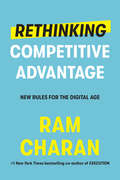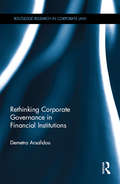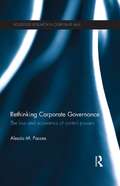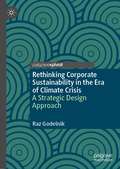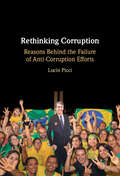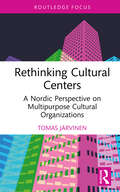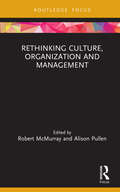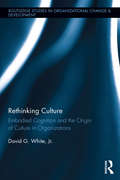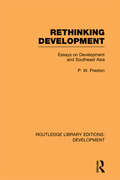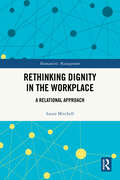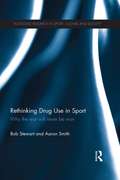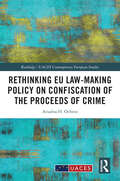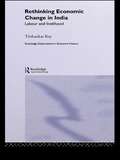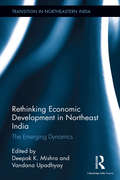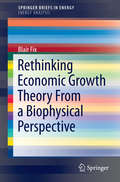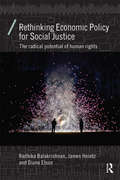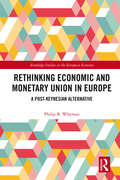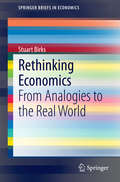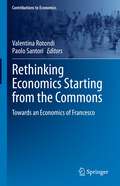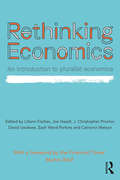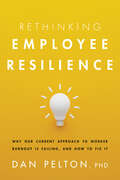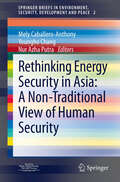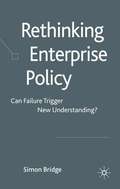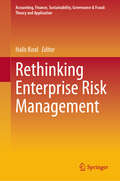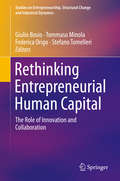- Table View
- List View
Rethinking Competitive Advantage: New Rules for the Digital Age
by Ram CharanHow do you gain an edge in the digital world order? &“Another book for the ages from a master! . . . Particularly insightful is his emphasis on how the end-to-end individual consumer experience will separate winners from losers in our new digital age.&”—Fred Hassan, chairman, Caret Group; former CEO, Schering-Plough and PharmaciaThe old ways of creating competitive advantage for your business—such as building moats to ward off competitors—have become dangerous. Giants like Amazon and Alibaba are creating vast new market spaces through a deft combination of tools like machine learning and business savvy that reimagines customer experiences while generating immense shareholder value. A handful of traditional companies, including Fidelity Investments, Walmart, and B2W, have adopted these new approaches to reinvigorate their businesses. Most, however, are stalled—and the clock is running out. In this lively, accessible guide, Ram Charan, bestselling author and adviser to some of the world&’s top CEOs and boards, redefines competitive advantage for the digital-first era, offering a set of new rules to get ahead:• Create an ecosystem with third-party partners to revolutionize and personalize the customer experience.• Empower teams focused on a single task, building a &“social engine&” that drives constant innovation, fast execution, and customer satisfaction.• Attract funders who understand the big picture: that beyond a certain scale, major upfront spending will turn into a cash-generation machine. Filled with stories that peek behind the curtain of digital behemoths as well as traditional companies that have transformed their organizations, Rethinking Competitive Advantage offers concrete advice and methods to help you conceive of new market spaces and moneymaking models. Competing against digital giants might seem daunting, if not impossible. The necessary computing power is within any company&’s reach. By borrowing from these digital winners&’ playbooks, traditional companies and upstarts alike can gain an upper hand. Whether you&’re in the C-suite or brainstorming the next big idea from your garage, Rethinking Competitive Advantage is the ultimate guide to creating competitive advantage today.
Rethinking Corporate Governance in Financial Institutions (Routledge Research in Corporate Law)
by Demetra ArsalidouThere are many deep-seated reasons for the current financial turmoil but a key factor has undoubtedly been the serious failings within the corporate governance practices of financial institutions. There have been shortcomings in the risk management and incentive structures; the boards’ supervision was at times weak; disclosure and accounting standards were in some cases inadequate; the institutional investors’ engagement with management was at times insufficient and, last but not least, the remuneration policies of many large institutions appeared inappropriate. This book will provide a critical overview and analysis of key corporate governance weaknesses, focusing primarily on three main areas: directors’ failure to understand complex company transactions; the poor remuneration practices of financial institutions; and, finally, the failure of institutional investors to sufficiently engage with management. The book, while largely focused on the UK, will also consider EU and Australian developments as well as offering a comparative angle looking at the corporate governance of financial institutions in the US.
Rethinking Corporate Governance: The Law and Economics of Control Powers (Routledge Research in Corporate Law)
by Alessio PaccesThe standard approach to the legal foundations of corporate governance is based on the view that corporate law promotes separation of ownership and control by protecting non-controlling shareholders from expropriation. This book takes a broader perspective by showing that investor protection is a necessary, but not sufficient, legal condition for the efficient separation of ownership and control. Supporting the control powers of managers or controlling shareholders is as important as protecting investors from the abuse of these powers. Rethinking Corporate Governance reappraises the existing framework for the economic analysis of corporate law based on three categories of private benefits of control. Some of these benefits are not necessarily bad for corporate governance. The areas of law mainly affecting private benefits of control – including the distribution of corporate powers, self-dealing, and takeover regulation – are analyzed in five jurisdictions, namely the US, the UK, Italy, Sweden, and the Netherlands. Not only does this approach to corporate law explain separation of ownership and control better than just investor protection; it also suggests that the law can improve the efficiency of corporate governance by allowing non-controlling shareholders to be less powerful.
Rethinking Corporate Sustainability in the Era of Climate Crisis: A Strategic Design Approach
by Raz GodelnikThis book provides a clear, critical, and timely analysis of the state of corporate sustainability within the context of the climate crisis. It offers not only a substantive critique of the current efforts but also clarity about the changes needed and how to implement them. The book goes beyond the more common debate on shareholder capitalism vs. stakeholder capitalism to explain the shortcomings of the current approach to sustainability in business, which the author describes as sustainability-as-usual. Using strategic design lenses, the author proposes a new model of awakened sustainability, which offers a transformational shift in corporate sustainability to ensure companies fairly and effectively address the climate crisis. The book presents the numerous changes needed in the environment in which companies operate to enable awakened sustainability and how these changes can be realized. Grounded in the scientific community’s calls for urgent action on climate change, this groundbreaking text provides scholars with an evaluation of current and future trends in corporate sustainability. It connects the dots between the progress made in the last five decades and the opportunities entailed in the work on a regenerative and just vision for companies in this decade and beyond.
Rethinking Corruption: Reasons Behind the Failure of Anti-Corruption Efforts
by Lucio PicciWhy have anti-corruption efforts often failed? Current thinking on corruption has largely overlooked the profound implications of its contested nature, which paradoxically makes it an effective yet highly dysfunctional 'tool of government.' As a tool of government, it helps execute policies and guarantees a degree of political order. Moreover, anti-corruption measures are wielded as political instruments, strategically embraced by governments and oppositions to further their respective agendas. Based on an analysis of Russia, Brazil and the United States, Rethinking Corruption takes a fresh look at corruption and critiques the prevailing view of anti-corruption policies. Embarking on a captivating journey through these countries, this book encompasses the notion of legal corruption and invites a comprehensive reconsideration of corruption, with a focal point on questions of economic and political equality.
Rethinking Cultural Centers: A Nordic Perspective on Multipurpose Cultural Organizations (Routledge Focus on the Global Creative Economy)
by Tomas JärvinenWhat are cultural centers for? This book offers a unique and dynamic guide to managing these organizations, and the challenge of reconciling cultural aims with business success. Drawing on research and practice, it provides case- based insights into common managerial problems and their solutions. Although international research demonstrates that culture has positive economic impact and many cultural institutions are multimillion dollar institutions, there has been little research on how cultural centers are managed to combine cultural and economic impact. Due to the diversity of their missions and purpose, cultural centers in Europe often struggle to find business success. By drawing on recent cases from Finland and Sweden, and focusing on the challenges that face both managers and organizations, this book explores the incentives that underpin the foundation of cultural centers, and what is needed to make them a success. By defining the complex challenges that face cultural centers, this book enables managers to move beyond administrating an organization to becoming cultural entrepreneurs, turning good ideas into good business. In this underresearched area, this book will be essential reading for researchers, policy makers and managers working in cultural centers and museum management.
Rethinking Culture, Organization and Management (Routledge Focus on Women Writers in Organization Studies)
by Alison Pullen Robert McMurrayThe purpose of this book is to reimagine the concept of culture, both as an analytical category and disciplinary practice of dominance, marginalization and exclusion. For decades culture has been perceived as a ‘hot topic’. It has been written about and deployed as part of ‘a search for excellence’; as a tool through which to categorise, rank, motivate and mould individuals; as a part of an attempt to align individual and corporate goals; as a driver of organizational change, and; as a servant of profit maximisation. The women writers presented in this book offer a different take on culture: they offer useful disruptions to mainstream conceptions of culture. Joanne Martin and Mary Douglas provide multi-dimensional holistic accounts of social relations that point up similarity and difference. Rather than offering totalising or prescriptive models, each author considers the complex, polyphonic and processual nature of culture(s) while challenging us to acknowledge and work with ambiguity, fluidity and disruption. In this spirit writings of Judi Marshall, Arlie Hochschild, Kathy Ferguson, Luce Irigaray and Donna Haraway are employed to disrupt extant management cultures that lionise the masculine and marginalise the concerns, perspectives and contributions of women and the diversity of women. These writers bring bodies, emotions, difference, resistance and politics back to the centre stage of organizational theory and practice. They open us up to the possibility of cultures suffused with multifarious potentiality rather than homogeneity and faux certainty. As such, they offer new ways of understanding and performing culture in management and organization. This book will be relevant to students and researchers across business and management, organizational studies, critical management studies, gender studies and sociology.
Rethinking Culture: Embodied Cognition and the Origin of Culture in Organizations (Routledge Studies in Organizational Change & Development)
by David G. WhiteOrganizational or corporate ‘culture’ is the most overused and least understood word in business, if not society. While the topic has been an object of keen academic interest for nearly half a century, theorists and practitioners still struggle with the most basic questions: What is organizational culture? Can it be measured? Is it a dependent or independent variable? Is it causal in organizational performance, and, if so, how? Paradoxically, managers and practitioners ascribe cultural explanations for much of what constitutes organizational behavior in organizations, and, moreover, believe culture can be engineered to their own designs for positive business outcomes. What explains this divide between research and practice? While much academic research on culture is challenged by ontological, epistemic and ethical difficulties, there is little empirical evidence to show culture can be deliberately shaped beyond espoused values. The gap between research and practice can be explained by one simple reason: the science and practice of culture has yet to catch up to managerial intuition.Managers are correct in suspecting culture is a powerful normative force, but, until now, current theory and research is not able to adequately account for cultural behavior in organizations. Rethinking Culture describes and presents evidence for a new framework of organizational culture based on the cognitive science of the so-called cultural mind. It will be of relevance to academics and researchers with an interest in business and management, organizational culture, and organizational change, as well as cognitive and cultural anthropologists and sociologists interested in applications of theory in organizational and institutional settings.
Rethinking Development: Essays on Development and Southeast Asia (Routledge Library Editions: Development)
by Peter PrestonFirst published in 1987, this volume stresses the importance of development studies for sociology, as P. W. Preston argues that this field of study is emerging from the technical social scientific ghetto back into the mainstream of the ‘classical tradition’ of social theorizing, represented by Marx, Weber and Durkheim. Preston discusses the position of development studies in relation to the wider group of the social sciences in general and to sociology in particular. Using examples mainly from the study of Southeast Asia, he looks at the diversity of available ‘modes of social theoretic engagement’ and considers the work of the colonial administrator scholar, the humanist academic scholar, and the scholar who theorises on behalf of the planners, discusses the mode of political writing, and Marxian analyses of development; and considers the particular problems surrounding the elites of post-colonial ‘nation states’.
Rethinking Dignity in the Workplace: A Relational Approach (Humanistic Management)
by Laura MitchellDignity in the context of work organisations has been explored by a range of scholars globally, yet the potential of this interdisciplinary concept is overwhelmed by our commitment to outdated philosophies and the narrow paradigmatic concerns of academic subdisciplines. Bringing together the work of sociologists, philosophers, political theorists, and a wide selection of business and management scholarship, this book highlights areas in which ‘workplace’ dignity needs a rethink. Starting with the foundational philosophical assumptions, this book challenges a deontological ethic and a simple atomistic view of persons. A specific thesis of dignity as emergent from social performance is presented which is informed by symbolic interactionism, actor-network theory, and liberal and feminist philosophy. With organisational examples throughout, this radical rethink has serious implications not only for the study of dignity in the context of contemporary work activity but also respecifies how we think about our obligations to ourselves and others in networks of relations.
Rethinking Drug Use in Sport: Why the war will never be won (Routledge Research in Sport, Culture and Society)
by Bob Stewart Aaron SmithDrug free sport is an unattainable aspiration. In this critical, paradigm-shifting reappraisal of contemporary drug policy in sport, Bob Stewart and Aaron Smith argue that drug use in sport is an inexorable consequence of the nature, structure and culture of sport itself. By de-mythologising and de-moralising the assumptions that prop up current drug management controls, and re-emphasising the importance of the long-term well being and civil rights of the athlete, they offer a powerful argument for creating a legitimate space for drug use in sport. The book offers a broad ranging overview of the social and commercial pressures impelling drug use, and maps the full historical and social extent of the problem. With policy analysis at the centre of the discussion, the book explores the complete range of social, management, policy, scientific, technological and health issues around drugs in sport, highlighting the irresolvable tension between the zero-tolerance model as advanced by WADA and the harm-reduction approach adopted by drug education and treatment agencies. While there are no simple solutions, as long as drugs use is endemic in wider society the authors argue that a more nuanced and progressive approach is required in order to safeguard and protect the health, social liberty and best interests of athletes and sports people, as well as the value of sport itself.
Rethinking EU Law-making Policy on Confiscation of the Proceeds of Crime (Routledge/UACES Contemporary European Studies)
by Ariadna H. OchnioThe book provides a critical analysis of EU law-making policy on the confiscation of the proceeds of crime, using a minimalist restorative approach to justice focused on the rights of victims and communities, and more proactive roles for all participants in confiscation procedures.This book shows how the examined policy has been translated into the EU law standards adopted as its realisation and whether the gaps identified in these standards are reflected in the domestic law of the comparator EU jurisdictions: Poland, Germany, and France. The post-conviction confiscation regime in England and Wales is also explored as an example of an alternative non-EU model of value-based confiscation. Considering the complex juridical nature of confiscation, which challenges the applicability of the civil–criminal dichotomy, this book recommends a twofold approach when shaping EU confiscation mechanisms, focused on linking policy objectives with a restorative approach to justice, and making the appropriate choice of criminal or civil routes for confiscation.This book will be of key interest to scholars, students, and practitioners in EU policy and law, criminal law, EU and national law on confiscation, EU criminal justice policy, and more broadly to European studies, criminology, and international organisations.
Rethinking Economic Change in India: Labour and Livelihood (Routledge Explorations in Economic History)
by Tirthankar RoyAs author of the hugely influential The Economic History of India 1857-1947, Tirthankar Roy has established himself as the leading contemporary economic historian of India. Here, Roy turns his attention to labour and livelihood and the nature of economic change in the Subcontinent. This book covers: economic history of modern India rural labour labour-intensive industrialization women and industrialization. Challenging the prevailing wisdom on Indian economic growth - that it is bound up with Marxian, postcolonial class analysis - Roy formulates a new view. Commercialization, surplus labour and uncertainty are seen as equally important and the end result reconciles the increasingly opposed view of economists and historians.
Rethinking Economic Development in Northeast India: The Emerging Dynamics (Transition in Northeastern India)
by Deepak K. Mishra VanDana UpadhyayEconomic development of frontier and remote regions has long been a central theme of development studies. This book examines the development experience in the northeastern region in India in relation to the processes of globalisation and liberalisation of the economy. Bringing together researchers and scholars, from both within and outside the region, the volume offers a comprehensive and updated analysis of governance and development issues in relation to the northeastern economy. With its multidisciplinary approaches, the chapters cover a variety of sectors and concerns such as land, agriculture, industry, infrastructure, finance, human development, human security, trade and policy. This book will be useful to scholars and researchers of economics, public policy, governance and development, geopolitics, geography, development studies, politics and sociology of development and area studies as well as observers and policymakers interested in the Northeast.
Rethinking Economic Growth Theory From a Biophysical Perspective
by Blair FixNeoclassical growth theory is the dominant perspective for explaining economic growth. At its core are four implicit assumptions: 1) economic output can become decoupled from energy consumption; 2) economic distribution is unrelated to growth; 3) large institutions are not important for growth; and 4) labor force structure is not important for growth. Drawing on a wide range of data from the economic history of the United States, this book tests the validity of these assumptions and finds no empirical support. Instead, connections are found between the growth in energy consumption and such disparate phenomena as economic redistribution, corporate employment concentration, and changing labor force structure. The integration of energy into an economic growth model has the potential to offer insight into the future effects of fossil fuel depletion on key macroeconomic indicators, which is already manifested in stalled or diminished growth and escalating debt in many national economies. This book argues for an alternative, biophysical perspective to the study of growth, and presents a set of "stylized facts" that such an approach must successfully explain. Aspects of biophysical analysis are combined with differential monetary analysis to arrive at a unique empirical methodology for investigating the elements and dependencies of the economic growth process.
Rethinking Economic Policy for Social Justice: The radical potential of human rights (Economics as Social Theory)
by Radhika Balakrishnan James Heintz Diane ElsonThe dominant approach to economic policy has so far failed to adequately address the pressing challenges the world faces today: extreme poverty, widespread joblessness and precarious employment, burgeoning inequality, and large-scale environmental threats. This message was brought home forcibly by the 2008 global economic crisis. Rethinking Economic Policy for Social Justice shows how human rights have the potential to transform economic thinking and policy-making with far-reaching consequences for social justice. The authors make the case for a new normative and analytical framework, based on a broader range of objectives which have the potential to increase the substantive freedoms and choices people enjoy in the course of their lives and not on not upon narrow goals such as the growth of gross domestic product. The book covers a range of issues including inequality, fiscal and monetary policy, international development assistance, financial markets, globalization, and economic instability. This new approach allows for a complex interaction between individual rights, collective rights and collective action, as well as encompassing a legal framework which offers formal mechanisms through which unjust policy can be protested. This highly original and accessible book will be essential reading for human rights advocates, economists, policy-makers and those working on questions of social justice.
Rethinking Economic and Monetary Union in Europe: A Post-Keynesian Alternative (Routledge Studies in the European Economy)
by Philip B. WhymanIn the wake of the Greek crisis, the future of the EU is the subject of a great deal of debate. This book critically evaluates the current new monetarist model of Economic and Monetary Union in Europe, presenting an alternative post-Keynesian (progressive) model, aimed at addressing the current problems of trade imbalance and asymmetric macroeconomic policy infrastructure that are augmenting tensions within the Eurozone. The book’s approach is based upon the development of a common, rather than a single, currency approach, and utilises post-Keynesian policy solutions in order to create a form of EMU which will promote full employment rather than austerity.
Rethinking Economics
by Stuart BirksThis brief responds to the criticism that mainstream economics is currently facing due to its heavy reliance on models and narrow range of quantitative research techniques. It takes a broader view, identifying issues that are also relevant for heterodox and pluralist approaches to economics. By acknowledging that the world of theory is not the same as the reality that we are trying to understand, the brief focuses on three paths that generally receive little attention. These are: from theory to the real world; from theory to empirical analysis; and from empirical results to policy application. Each path highlights a range of related concerns and qualifications, and the focus on these transitions provides a strong basis for critical evaluation of analyses and potentially more realistic results and recommendations. It also provides a framework for synthesizing information from alternative schools of thought and across disciplines. In addition, the importance of framing and rhetoric is demonstrated. The brief addresses philosophical and methodological issues using a clear, non-technical approach that can be easily understood by a non-specialist audience.
Rethinking Economics Starting from the Commons: Towards an Economics of Francesco (Contributions to Economics)
by Paolo Santori Valentina RotondiThis book proposes a new approach to economics, starting from the commons and based on the Economy of Francesco (EoF), a worldwide movement of young people who aim to change the current economic models and working towards a fair, sustainable, and inclusive economic system. EoF was convened by Pope Francis and is inspired by the example of St. Francis of Assisi, featuring Franciscan economic roots and institutions, as well as theories of the social sciences.The authors raise and answer several important questions throughout the volume, such as: What if the economic courses taught in the universities across the globe focused their attention on the topics of the commons rather than on private goods? What if social businesses, rather than being considered as a hybrid form of businesses, became the normal approach, and ethical and green finance ruled over the standard financial sector? Is it possible to move away from the primacy of the consumers to the preeminence of ethical consumers who express their preferences for an inclusive, sustainable, and workers-friendly economic system with their daily choices? Using a unique approach, the book includes the contributions of prominent scholars which are integrated and discussed by young international scholars, providing a fresh analysis with a glance of hope for the future. The book is a must-read for students, scholars, and researchers of economics and related disciplines interested in alternatives to the current economic mainstream in general, and the Economy of Francesco in particular.
Rethinking Economics: An Introduction to Pluralist Economics
by Liliann Fischer Joe Hasell J. Christopher Proctor David Uwakwe Zach Ward Perkins Catriona WatsonEconomics is a broad and diverse discipline, but most economics textbooks only cover one way of thinking about the economy. This book provides an accessible introduction to nine different approaches to economics: from feminist to ecological and Marxist to behavioural. Each chapter is written by a leading expert in the field described and is intended to stand on its own as well as providing an ambitious survey that seeks to highlight the true diversity of economic thought. <P><P> Students of economics around the world have begun to demand a more open economics education. This book represents a first step in creating the materials needed to introduce new and diverse ideas into the static world of undergraduate economics. This book will provide context for undergraduate students by placing the mainstream of economic thought side by side with more heterodox schools. This is in keeping with the Rethinking Economics campaign which argues that students are better served when they are presented with a spectrum of economic ideas rather than just the dominant paradigm. <P><P> Rethinking Economics: An Introduction to Pluralist Economics is a great entry-level economics textbook for lecturers looking to introduce students to the broader range of ideas explored within the economics profession. It is also appropriate and accessible for people outside of academia who are interested in economics and economic theory.
Rethinking Employee Resilience: Why Our Current Approach to Worker Burnout is Failing, and How to Fix It
by Dan PeltonRethinking Employee Resilience is a practical, evidence-based guide to creating workplaces that invest in their workforce - the backbone of every organization. In an era of institutional collapse, workforce resilience isn&’t a luxury; it&’s non-negotiable. Burnout has quietly become the new normal. As trust in institutions crumbles and career stability feels like a relic of the past, organizations face a choice: cling to outdated models or redefine their cultures to prioritize human resilience. This book challenges the self-help industry&’s one-size-fits-all narrative, reframing burnout as a systemic issue embedded within organizational culture. It unfolds in three parts: debunking common burnout myths, redefining employee resilience, and offering tailored &‘on-ramps&’ for organizations of all sizes. Drawing from his work as a clinical psychologist in Afghanistan, where he provided mental health care to thousands of soldiers, to a decade leading mental health initiatives in management consulting, Dr. Dan Pelton has seen how burnout takes root—and knows how to dismantle it.Rethinking Employee Resilience isn&’t just another leadership manual filled with hollow platitudes. This book rejects the status quo — an unconventional guide for leaders and employees to transform organizational culture, grounded in empirical research, industry insights, and real-world experience.
Rethinking Energy Security in Asia: A Non-Traditional View of Human Security
by Mely Caballero-Anthony Youngho Chang Nur Azha PutraTraditional notions of security are premised on the primacy of state security. In relation to energy security, traditional policy thinking has focused on ensuring supply without much emphasis on socioeconomic and environmental impacts. Non-traditional security (NTS) scholars argue that threats to human security have become increasingly prominent since the end of the Cold War, and that it is thus critical to adopt a holistic and multidisciplinary approach in addressing rising energy needs. This volume represents the perspectives of scholars from across Asia, looking at diverse aspects of energy security through a non-traditional security lens. The issues covered include environmental and socioeconomic impacts, the role of the market, the role of civil society, energy sustainability and policy trends in the ASEAN region.
Rethinking Enterprise Policy
by Simon BridgePolicies to increase the level of enterprise and entrepreneurship, in many countries and regions, have often failed. This book explores this and gives alternative views to derive a different model, based on social influence, which is consistent with the evidence and which might therefore lead to better policy.
Rethinking Enterprise Risk Management (Accounting, Finance, Sustainability, Governance & Fraud: Theory and Application)
by Halis KıralThis book provides a critical analysis of existing enterprise risk management models and practices and proposes innovative solutions to address the challenges associated with implementing enterprise risk management strategies. Enterprise risk management activities are not high on the priority agenda of the senior management in both public and private sectors. Conceptual ambiguity and methodological gaps in current standards and frameworks make it difficult to effectively implement enterprise risk management. Therefore, this book’s approach to enterprise risk management aims to eliminate the unit-based silo approach of traditional risk management, adopting a function-based silo approach. It focuses on the management of fewer and more significant risks associated with high-level objectives, rather than all business processes of the organization, thus increasing the success of enterprise risk management implementation. The book would be a valuable read for business executives, internal and external auditors, business school students and academics.
Rethinking Entrepreneurial Human Capital: The Role of Innovation and Collaboration (Studies on Entrepreneurship, Structural Change and Industrial Dynamics)
by Giulio Bosio Tommaso Minola Federica Origo Stefano TomelleriThis book focuses on the specific traits and nature of entrepreneurial human capital and the extent to which it can be stimulated by entrepreneurship education – especially when these activities combine collaborative practices and innovation. It includes a comprehensive collection of articles on how entrepreneurship education can be structured, providing theoretical reflections as well as empirical evidence. As such it contributes to the ongoing debate on the teachability of entrepreneurial skills and the role of innovation and collaboration in the design of educational programs that aim to spread entrepreneurial human capital.
